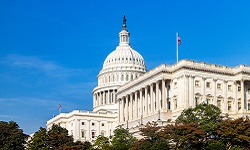 Barbara’s Blog: The American Public Supports Bolstering U.S. Competitiveness Through Science
Barbara’s Blog: The American Public Supports Bolstering U.S. Competitiveness Through Science
Earlier this week, AAU President Barbara R. Snyder published a blog post on new polling, conducted for AAU, showing that the American public broadly supports federal funding for research in order to maintain our country’s scientific and economic competitiveness. President Snyder writes that, as Congress crafts a competitiveness legislation package to boost our country’s global leadership in science and innovation, it should listen to the American public to set ambitious research funding goals and make a down payment with actual appropriations to help realize those goals.
In the blog post, President Snyder describes a set of polls conducted by SSRS on AAU’s behalf this past March and April to measure the American public’s attitudes toward research funding. The polls show that almost 9 in 10 Americans (88%) say that it is important for the United States to be the “global leader in scientific research and technology.” Four out of five Americans also find it believable that foreign countries outpacing us in research funding is a “national crisis that policymakers should respond to.” Additionally, 46% of Americans support an increase in federal funding for scientific and medical research, while far fewer (11%) support decreasing such funding.
As President Snyder writes in the blog post, the American public understands how crucial it is for Congress to meet this moment in history by increasing funding for research. She urges members of Congress to listen to them and to reach a bipartisan conference agreement on the Senate-passed U.S. Innovation and Competition Act and the House-passed America COMPETES Act that would help our nation maintain its competitive edge.
 New NSB Policy Brief Says International STEM Talent Is Crucial for a Robust U.S. Economy
New NSB Policy Brief Says International STEM Talent Is Crucial for a Robust U.S. Economy
A new policy brief from the National Science Board argues that the United States must institute measures to continue attracting international STEM talent so that we remain the global leader in science and innovation and to protect our national security and economic well-being. The policy brief notes that international student enrollment in the United States has declined at the same time as other countries are investing more in research and development and opening their doors to international students and workers. The brief argues that the United States must proactively attract international STEM talent and create “a streamlined and expanded visa system” to welcome international students and workers.
NSB’s policy brief highlights that nearly 60% of doctoral degrees in computer science, mathematics, and engineering are awarded to foreign-born international students, many of whom stay in the United States after graduation and become U.S. citizens. These individuals form the backbone of the American innovation enterprise – a point AAU President Barbara R. Snyder also made recently in a blog post. “If we are to tackle future pandemics and help solve some of the most pressing challenges currently facing the world and the United States, we need to make it easier for individuals earning their advanced STEM degrees to live and work in our country,” wrote President Snyder.
The NSB’s policy brief highlights, once again, the need for Congress to take action. The pending competitiveness legislation offers just such an opportunity; the America COMPETES Act contains provisions that would exempt certain advanced STEM degree holders from annual numerical limits on green cards and create a new visa for foreign entrepreneurs. As lawmakers negotiate a compromise on the final package, it is absolutely vital that they retain these measures and help bolster our nation’s competitiveness on the global stage.
 HHS Formally Establishes ARPA-H and Names Adam H. Russell as Acting Deputy Director
HHS Formally Establishes ARPA-H and Names Adam H. Russell as Acting Deputy Director
On Wednesday, federal Health and Human Services Secretary Xavier Becerra announced the formal establishment of the Advanced Research Projects Agency for Health (ARPA-H) as an independent entity within the National Institutes of Health. Becerra also announced the appointment of Adam H. Russell as the acting deputy director of ARPA-H.
Russell is currently the chief scientist at the University of Maryland’s Applied Research Laboratory for Intelligence and Security. According to HHS, Russell “will guide the early stages of building the administrative structure of the agency and oversee the hiring of initial operational staff to ensure the agency is stood up as effectively and efficiently as possible.” HHS also stated that President Biden will appoint an ARPA-H director who will be responsible for the “administration and operation” of the agency and who will report to the HHS secretary.
AAU Joins Global University Groups in Endorsing Leiden Principles on the Role of Research-Intensive Universities
AAU has joined the League of European Research Universities, the Canadian U15, the United Kingdom’s Russell Group, the Japanese Research University 11, the German U15, and the Australian Group of Eight in signing on to the Leiden Principles on the role of research-intensive universities as the world emerges from the COVID-19 pandemic. Collectively, the organizations represent 161 leading research universities around the world. The principles were finalized and adopted during a conference in Leiden, Netherlands, last week.
The principles reaffirm the 2013 Hefei Statement, which identified 10 fundamental characteristics of research-intensive universities. The new statement looks ahead to how universities can continue to deliver solutions to some of the most pressing challenges facing our post-pandemic world. It identifies five specific principles that would prove critical in this endeavor – trust, diversity, openness, stewardship, and freedom. As the statement notes, these principles would “ensure the continued and valued contribution of research-intensive universities.” The statement outlines each principle in detail and commits AAU and our global partners to continue collaborating on developing new treatments and interventions for diseases such as COVID-19; educating the next generation of leaders and researchers; creating jobs and opportunities; and tackling global challenges, including climate change.
Senate HELP Committee Advances Nasser Paydar’s Nomination as Assistant Secretary for Postsecondary Education
The Senate Health, Education, Labor, and Pensions Committee voted 15-7 on Wednesday to advance the nomination of Nasser Paydar to be assistant secretary for postsecondary education at the Department of Education. The nomination will next be considered by the full Senate. The assistant secretary for postsecondary education provides overall direction, coordination, and leadership for federal higher education programs.
Earlier this year, AAU President Barbara R. Snyder sent a letter to the committee expressing support for Paydar’s nomination. In the letter, President Snyder called Paydar a widely respected leader who has worked throughout his career to make “postsecondary education more accessible and affordable for all who seek education and training to advance their knowledge, skills, and careers.” Paydar was previously chancellor of Indiana University–Purdue University Indianapolis and executive vice president of Indiana University.
 Hill Update: Lawmakers Announce Timeline for Completing Negotiations on USICA/COMPETES; Appropriators Discuss Topline Spending Levels
Hill Update: Lawmakers Announce Timeline for Completing Negotiations on USICA/COMPETES; Appropriators Discuss Topline Spending Levels
The House is out of session this week, and both the House and the Senate are out next week. Congressional staff, however, will continue their work on the competitiveness legislation and on FY23 appropriations bills. Here are the latest updates on both, as well as an outlook on what might be on Congress’s agenda when it returns from recess:
USICA/COMPETES: It has now been almost two weeks since the congressional conference committee tasked with negotiating the differences between the Senate-passed U.S. Innovation and Competition Act and the House-passed America COMPETES Act began meeting officially. House Speaker Nancy Pelosi (D-CA) said last week that Congress could pass the legislation before July 4. According to a timeline obtained by Punchbowl News last week, House and Senate leadership is seeking to file the final conference report by June 21. Sen. Todd Young (R-IN) also predicted a similar timeline and noted that the final legislation is likely to resemble the Senate-passed USICA. Punchbowl News reported Young as saying: “My House colleagues have not yet understood that they need to make sure the bill looks like our Senate bill. Period. End of story. Full stop. Not moving towards their model, period. Or we won’t have a bill.” Punchbowl News also reported that staff at the committee level are continuing to discuss “outstanding issues including the trade titles and revamping the National Science Foundation.”
FY23 Appropriations: The new fiscal year begins in less than five months and appropriators have yet to determine allocations across the 12 annual bills. While it’s not out of the ordinary for the top four appropriations committee leaders to spend time negotiating topline spending levels, they had hoped to reach a quick agreement this year. The delay is due to work on a variety of supplemental funding bills, including a $40 billion Ukraine aid package; a stalled $10 billion measure needed to restock COVID-19 therapeutics, vaccines, and other supplies; and a $28 million bill to help the Food and Drug Administration address the baby formula shortage.
Senate Appropriations Committee Chair Patrick J. Leahy (D-VT) and Ranking Member Richard Shelby (R-AL) met twice this past week to discuss next steps for FY23 appropriations. After their latest meeting, Shelby said that the two were hoping to meet with leaders from the House Appropriations Committee soon to nail down the topline figures. According to Bloomberg Government (subscription required), “A top aide to Leahy said if the two sides could strike a deal on top lines to set spending levels for the 12 spending bills that Leahy may try to mark them up beginning in July.” Meanwhile, the House Appropriations Committee has tentatively scheduled subcommittee markups for June 13-22 and full committee markups for June 22-30. That schedule, if it holds, would allow for House floor action in July.
Congressional Outlook: Congress is expected to debate background check gun legislation upon return. Senate Majority Leader Chuck Schumer (D-NY) has also been meeting with Sen. Joe Manchin (D-WV) to discuss a pared-down reconciliation bill. Manchin has signaled that he may be willing to support a bill focused on energy and climate, raising taxes on corporations, deficit reduction, and negotiating prescription drug prices.
News of Interest
The Detroit News: University of Michigan Creates Abortion Access Task Force – The University of Michigan has created an abortion access task force to determine how the overturning of Roe v. Wade would affect “clinical care, educational instruction and student health.” University of Michigan Interim President Mary Sue Coleman said that she was “deeply concerned about how prohibiting abortion would affect UM’s medical teaching, our research, and our service to communities in need.” Among other things, the task force will provide resources to those needing to access abortions outside of Michigan and work toward mitigating the potential impacts of a state-wide abortion ban.
Inside Higher Ed: A 5th Straight Semester of Enrollment Declines – According to new data from the National Student Clearinghouse Research Center, enrollment at institutions of higher education declined by 4.1% in spring 2022. While first-time freshman enrollment ticked up, fewer Black students enrolled in college compared to last spring. Public community colleges were again the most affected, with enrollment declining by 7.8% compared to spring 2021.
Reuters: Berkeley Law to Eliminate Tuition for Native American Students – The University of California, Berkeley School of Law announced that it will waive tuition for Native American students who are California residents and members of a federally recognized tribe. The school hopes that the initiative will increase Native American enrollment and help expand its offerings in Indian law. The school also hopes to eventually expand the program to students who do not reside in California.
The Boston Globe: Brown Adopts Land Acknowledgment, Recognizing Its Location Within Ancestral Homelands of Narragansett Indian Tribe – Brown University has established an official land acknowledgement that recognizes the school’s location “within the ancestral homelands of the Narragansett Indian Tribe.” According to Brown, the acknowledgment is part of a larger effort to enhance the relationship between the campus community, the indigenous peoples of the region, and the land the university sits upon.
Chronicle of Higher Education: Financial-Aid Offices Are Short-Staffed – and Some Are “Drowning” as a Result – New survey results from the National Association of Student Financial Aid Administrators indicate that colleges are struggling to find and retain financial aid staff. Financial aid workers are usually responsible for meeting state and federal regulations as well as assisting students and families. During the pandemic, they have also been responsible for delivering aid to students from the Higher Education Emergency Relief Fund. The association noted that the shortage has created challenges that are reaching “crisis” levels.
The News & Observer: UNC-Chapel Hill Researchers Receive Federal Grant to Help Stave Off Another Pandemic – Researchers at the University of North Carolina at Chapel Hill will use a $65 million federal grant to create a new antiviral drug discovery center focused on developing treatments that could help battle future diseases and pandemics. Researchers will pay special attention to creating antiviral drugs for viruses that have evolved rapidly in the 21st century.
Featured Research

How Decades of Racism Have Shaped Buffalo
A 2021 report from the Center for Urban Studies at the University at Buffalo is in the news again in light of a shooting at a Buffalo supermarket earlier this month. The report finds that discriminatory policymaking caused severe racial residential segregation in the city and led to the underdevelopment of predominantly Black neighborhoods.

Tiny Robotic Crab Is Smallest-Ever Remote-Controlled Walking Robot
Engineers at Northwestern University have created the world’s smallest remote-controlled robot. The half-millimeter, crab-shaped robot can walk, bend, twist, and jump. Researchers hope that the technology will help bring them closer to creating tiny robots that can complete tasks in confined spaces, such as within the human body or inside machines.